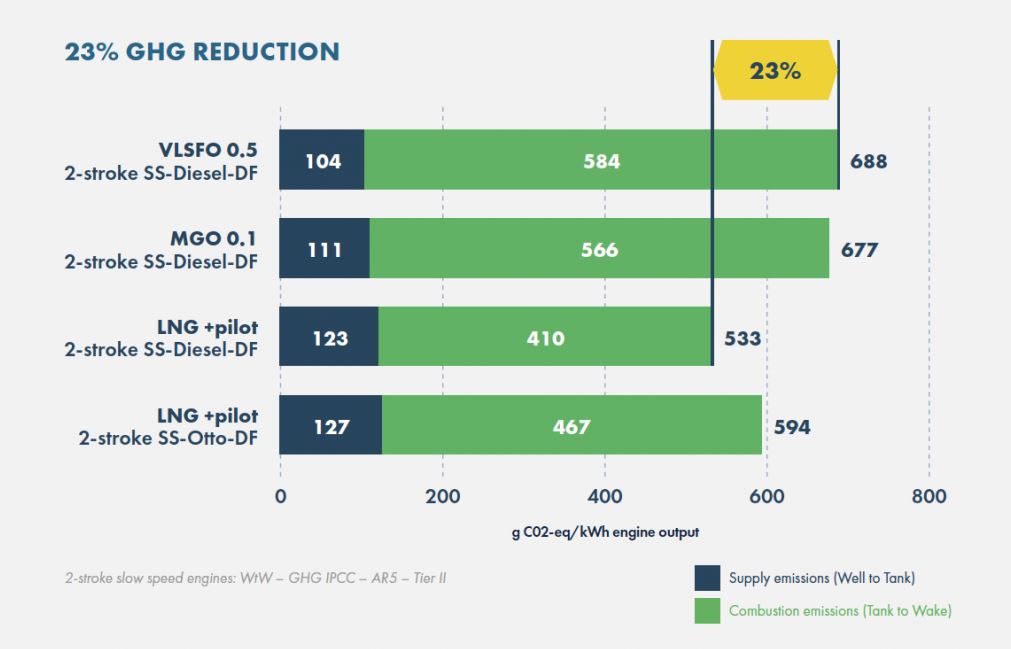A study commissioned by industry coalitions SEA-LNG and SGMF says that using LNG as a marine fuel can reduce greenhouse gas reductions by up to 23 percent, depending on the marine technology employed.
This compres with the emissions of current oil-based marine fuels measured from Well-to-Wake (WtW). The 2nd Lifecycle GHG Emission Study on the use of LNG as a marine fuel from Sphera (formerly thinkstep) revisits its 2018/2019 research, using the latest available engine and supply chain data to bring the study fully up to date, a joint statement said.
The partners say they conducted the study according to ISO standards. A panel of “leading independent academic experts” from key institutions in France, Germany, Japan and the USA also reviewed the study, the statement said.
The analysis concluded that, in addition to the considerable air quality benefits it delivers, LNG can “beyond question” contribute significantly to the International Maritime Organisation’s (IMO) GHG reduction targets, they said.
LNG plays “important role” in decarbonisation
Commenting on the research, SEA-LNG Chairman Peter Keller said: “It is clear that LNG plays an important role in decarbonisation today with benefits available now.
As we look ahead, it is essential that detailed emissions analysis from Well to Wake such as those performed for LNG are available for all alternative fuels contemplated, enabling shipowners to make the right decisions for their fleet.”
This report uses the latest primary data to assess all major types of marine engines and global sources of supply with quality data provided by original equipment manufacturers, the statement said.
These include Caterpillar MaK, Caterpillar Solar Turbines, GE, MAN Energy Solutions, Rolls Royce (MTU), Wärtsilä, and Winterthur Gas & Diesel, as well as from ExxonMobil, Shell, and Total on the supply side.
Methane emissions from the supply chains as well as methane released during the onboard combustion process (methane slip) have been included in the analysis, the statement said.
Methane slip has become an “overused” argument
Keller said: “Often based on outdated data, methane slip has become an overused argument for those wishing to justify inaction. The Sphera study underlines the advances being made to counteract this concern. Its analysis provides independent confirmation that, by 2030, methane slip will have been virtually eliminated as technological improvements continue.
The facts consistently confirm that there is no deep-sea alternative fuel in the short to medium term other than LNG. LNG remains the clear starting point for a carbon-neutral future for shipping, especially as the pathway forward includes bio and synthetic products. Waiting is not an option. The industry must act now to capture the benefits that are clearly there for the taking by using LNG.”
Importantly, the study also reaffirms that the use of LNG as a marine fuel has significant air quality benefits, with local emissions, such as sulphur oxides (SOx), nitrogen oxides (NOx) and particulate matter (PM), all close to zero, the statement said.
LNG is a “clear” choice
Samir Bailouni, chairman, Society for Gas as a Marine Fuel (SGMF), added: “It is important the industry has the best information to make often complex choices between fuels. This study provides authoritative, high-quality data on Well-to-Wake emissions for LNG.
We are confident this work will provide IMO with solid information contributing to its regulatory decisions. SGMF will continue to provide up-to-date data not only for LNG but for all candidate gaseous fuels under its remit, including ammonia and hydrogen,” he said.
“Today, the clear choice for an immediate and significant reduction in emissions is LNG, which is widely available and fully compliant with existing regulations.”
The “rapidly increasing” adoption of LNG in the deep-sea container, bulk and tanker sectors, shows that a growing number of owners opt for the fuel.
SGMF expects this trend to accelerate even as the more challenging horizon fuels come into the mix, Bailouni said.
Recognition for LNG and its pathway to a decarbonised future for shipping is accelerating. The transition to bio and eventually synthetic LNG is straightforward, as the existing infrastructure and engine technology remain the same, the statement said.

